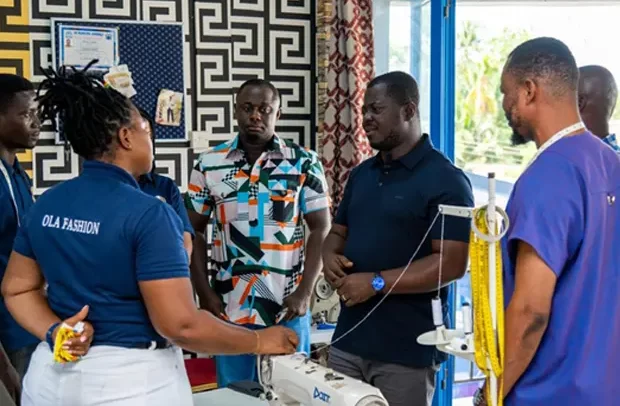Kofi Agyepong interacting with a business owner
The Youth Employment Agency (YEA) under the leadership of its Chief Executive Officer (CEO), Kofi Agyepong has provided a major relief to the businesses of some 1,452 individuals who are literally struggling to pay their workers.
This was after a successful verification and payment of some 1,500 individuals under its Business and Employment Assistance Programme (BEAP).
They are the first batch to benefit from the programme, with the next set of beneficiaries expected to receive their payments next month.
This is aimed at bolstering Ghana’s economic recovery from the effects of the COVID-19 pandemic.
The BEAP programme was designed to support 10,000 Small and Medium Scale Enterprises (SMEs) and start-ups severely impacted by the pandemic.
These individuals have been strategically placed within various sectors including but not limited to eateries (chop bars), pharmacies, and schools, receiving vital salary support amidst ongoing economic challenges.
The disbursement of payments is seen as a significant milestone in YEA efforts to alleviate unemployment and support struggling enterprises,
Each beneficiary worker therefore received an amount of GH¢ 500, as payment from BEAP for the employer to top up the remaining amount to make up for the salary.
This is intended to mitigate financial strains faced by businesses as indicated in a recent survey by the Ghana Statistical Service (GSS).
The 1,452 businesses constitute the first phase of the BEAP initiative, with more businesses expected to be added every month.
BEAP does not only provide a lifeline to SMEs but also aims to foster employment opportunities across Ghana, targeting a total of 20,000 beneficiaries as part of its broader initiative.
YEA Director of Corporate Affairs, Kwasi Afriyie said they remain committed to utilising sustainable funding from the Communication Service Tax exclusively for job creation and economic empowerment initiatives.
In addition to BEAP, he said the YEA has been instrumental in various employment and skills training programmes, collaborating closely with state agencies to enhance community services, health care, and vocational training opportunities.
Targeting various establishments he said the programme will strive to alleviate the financial burden on these enterprises while bolstering employment opportunities for Ghana’s workforce.
“The plan is to support 10,000 companies, facilitating the employment of approximately 20 000 individuals,” he said.
In the year 2022/2023, the government of Ghana through YEA recruited 15,000 Community Protection Assistants working with the Ghana Police Service,
It also recruited 6,000 Community Health Workers for the Ghana Health Service, 1,500 Prison Office Assistants for the Ghana Prisons Service, 4,000 workers on the Cocoa Rehabilitation Programme, 5,000 Insurance Agents for the National Insurance Commission with base pay whilst 13,000 direct jobs were secured through the YEA Job Centre.
Some 2,000 dressmaking trainees also underwent apprenticeship training with GH¢500 monthly support and over 30,000 entrepreneurs who were trained by both the National Entrepreneurship and Innovation Programme (NEIP) and the Ghana Library Board with support for set-ups, whilst 2,000 other young men and women were trained by the Accra Digital Centre in Basic and Advanced IT skills.
Currently, YEA is recruiting another 20,000 young people to be trained and set up in 10 different trade areas of carpentry, masonry, plumbing, hairdressing, beauty care, auto works, General Electricals, Plaster of Paris (POP), Steel Works, Welding and Fabrication and Painting.
Arrangements have been made for training to start next week whilst 45,000 people have also benefitted from its Sanitation Module and financial support given to over 500 dress makers and 40 large garment companies.
The YEA chain of initiatives is, therefore, credited for impacting various sectors of the Ghanaian economy, including community services, health, entrepreneurship, and vocational training, experienced substantial growth, offering a beacon of hope for Ghanaian youth seeking stable employment and entrepreneurial ventures.
By Charles Takyi-Boadu


